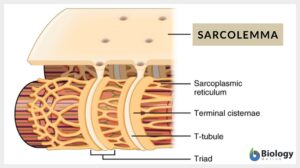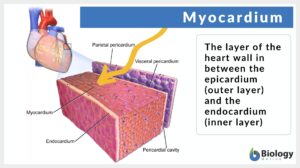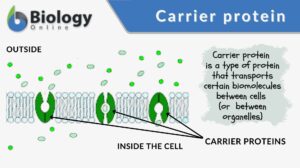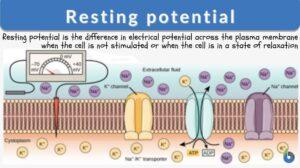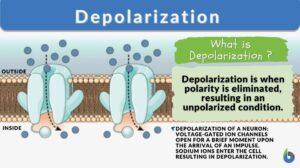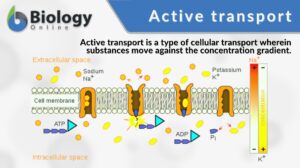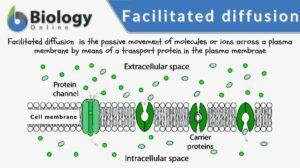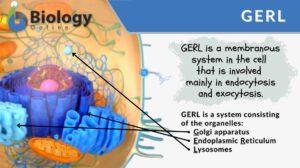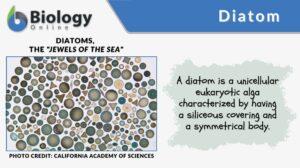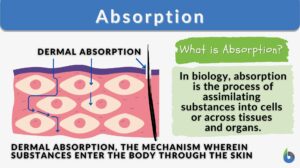Search Results for: pumps
Sarcolemma
Sarcolemma Definition What is the sarcolemma? It is the thin, transparent, extensible plasma membrane of the muscle cell.... Read More
Endoplasmic reticulum
Endoplasmic Reticulum Definition The endoplasmic reticulum is a membrane-bound organelle in cells of eukaryotic cells... Read More
Homeostasis
Homeostasis is the tendency not to stray from the range of favorable or ideal internal conditions. Such conditions must be... Read More
Myocardium
Myocardium Definition What is the myocardium of the heart? It is the muscular middle layer of the heart that is... Read More
Sarcoplasmic reticulum
Definition noun plural: sarcoplasmic reticula (cell biology) The special type of smooth endoplasmic reticulum found in... Read More
Carrier protein
Carrier protein is a type of cell membrane protein involved in facilitated diffusion and active transport of substances out... Read More
Resting potential
Resting Potential Definition The resting potential of a cell is defined as the difference in electrical potential across... Read More
Neural Control Mechanisms
Nerve cells called neurons generate electric signals that pass from one end of the cell to another and release chemical... Read More
Double circulation
Definition noun A type of blood circulation system in which the blood flows through the heart twice. In this type of... Read More
Depolarization
Depolarization is the removal of polarity by a process or action. It might also be used to describe how such activity leads... Read More
Energy coupling
What is Energy Coupling? Work, whether it be physical or biological, requires energy to be expended. In biological... Read More
Active transport
Active transport is a type of cellular transport in which substances (e.g. ions, glucose, and amino acids) are transported... Read More
Facilitated diffusion
Facilitated diffusion is the transport of substances across a biological membrane from an area of higher concentration to an... Read More
Phagolysosome
Definition noun plural: phagolysosomes (cell biology) A cytoplasmic body that forms from the fusion of phagosome and... Read More
Sodium-potassium pump
Definition noun A transmembrane ATPase enzyme located in the plasma membrane of animal cells, and functions by pumping... Read More
Water in Plants
The movement of molecules, specifically water and any solutes, is vital to understand in light of plant processes. This will... Read More
Alkaliphile
Definition noun, plural: alkaliphiles An organism that can live and thrive in an alkaline environment Supplement An... Read More
Closed circulatory system
Definition noun A type of circulatory system where blood circulates within closed vessels, thus, blood is distinct from... Read More
Muscular system
Muscular System Definition What is the muscular system? The muscular system is a system that includes muscle cells and... Read More
Peristalsis
What is Peristalsis? Peristalsis is the series of involuntary, wave-like muscle movements in the cylindrical, hollow tube... Read More
Acidophile
Definition noun, plural: acidophiles An organism that can or must live in an acidic environment Supplement An acidophile is... Read More
Cardiovascular system
Definition noun The organ system in which the blood is pumped through the heart and circulates throughout the body through... Read More
Polarization
Definition noun (general) The condition of polarity (biology) The process or act of producing positive and negative... Read More
Aldosterone
Definition noun, plural: aldosterones A mineralocorticoid with a chemical formula of C21H28O5, and controls salt and water... Read More
Chlorophyll
Why are most plants green? Have you ever had the same question? Perhaps, you’ve been told that the plants are green... Read More
Cell membrane
Cell Membrane Definition Just like any non-living body possesses a plastic or paper packaging material that keeps the... Read More
Phagocytosis
Phagocytosis Definition Phagocytosis is a basic physiological cellular process wherein a cell ingests a solid particle... Read More
Absorption
Absorption can be defined as the process of assimilating substances across the intestinal epithelial cells or the tissues... Read More
Kidneys and Regulation of Water and Inorganic Ions
Renal Functions Kidneys remove/add substances from/to the plasma. Regulate water concentration, inorganic ion... Read More
